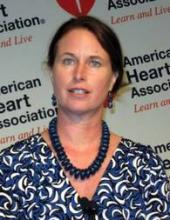ORLANDO – A history of forced sex before 18 years of age was associated with a 56% increased risk of premature cardiovascular events among women participating in the Nurses' Health Study II.
In all, 11% of the nurses enrolled in the study reported having been raped or subjected to other forms of severe forced sexual activity during childhood or adolescence. They had a 56% increased rate of acute MI or stroke before age 60, compared with those who had no history of early sexual abuse. The association was stronger for stroke than MI, Janet Wilson Rich-Edwards, Sc.D., reported at the annual scientific sessions of the American Heart Association.
The Nurses' Health Study II is the latest and far and away the largest of three studies by different research groups showing that sexually abused girls are at significantly increased cardiovascular risk as adults. It was also the most rigorous of the studies in terms of ascertainment of cardiovascular events, which were typically validated by participants’ medical records, explained Dr. Rich-Edwards of the department of epidemiology at Brigham and Women’s Hospital, Boston.
She and her colleagues were able to analyze the impact of the standard cardiovascular risk factors as mediators of the association between early sexual abuse and premature cardiovascular events. The investigators found that smoking, alcohol consumption, diabetes, adult body mass index, and hypertension accounted for 38% of the association between forced sexual activity and cardiovascular events.
"That still leaves a lot of the risk left unexplained," she noted.
This analysis of the Nurses’ Health Study II included more than 67,000 nurses, most of them white, who in 2001 completed a questionnaire on sexual and physical abuse and who were 43-60 years old in 2007. By that year, 513 cases of stroke or MI had occurred in this relatively young population.
In addition to the 11% of subjects who reported forced sex before age 18, another 22% reported sexual touching-only by an older person. Some 9% of study participants indicated that they had experienced severe physical abuse (defined as having been hit repeatedly with an object, choked, or burned) before age 18.
Nurses with a history of childhood sexual touching but no further childhood sexual abuse had a cardiovascular event rate similar to that of women with no history whatsoever of childhood sexual abuse, in an analysis that was adjusted for age, race, parental cardiovascular disease history, body type at age 5 years, and parental education.
Women with a history of rape or other forced sex before age 18 had a 56% increased relative risk when the same factors were taken into account. When rates of the standard adult cardiovascular risk factors also were factored into the analysis, this association was somewhat attenuated. However, childhood forced sexual activity remained independently associated with a highly significant 34% increased risk of cardiovascular events, compared with women who had no history of early sexual abuse.
Severe physical abuse prior to age 18 was associated with an adjusted 46% increased risk of MI or stroke in the first-round analysis. However, when the results were further adjusted for the standard adult cardiovascular risk factors, the conventional risk factors were found to account for 47% of the association between severe physical abuse and cardiovascular disease. After that adjustment, severe physical abuse was associated with a residual 23% increased risk of cardiovascular events, which wasn’t statistically significant.
"It’s clear that this association is strong ... and we need to do a better job screening for and identifying childhood sexual abuse at an early age."
The 11% rate of rape or other forced sex prior to age 18 that was reported in this study is consistent with the findings of a landmark national telephone survey of 8,000 women conducted jointly by the National Institute of Justice and the Centers for Disease Control and Prevention in 1995-1996. In that National Violence Against Women study, 18% of surveyed women reported having been raped; 22% of first rapes occurred before age 12, and another 32% occurred at age 12-17.
"I have to say, no matter how many times I see these results, the data shock me every time," Dr. Rich-Edwards commented.
An important clinical implication of the Nurses’ Health Study II findings is that childhood sexual abuse has long-lasting effects. "There’s a really long tail of chronic disease that ensues from this," she stressed.
Given that close to 40% of the increased premature cardiovascular event rate in women with a history of childhood sex abuse can be explained by elevated levels of the standard cardiovascular risk factors, risk factor modification efforts should probably be applied at an earlier age in such women. Heightened stress reactivity among women with a history of abuse might figure in their increased cardiovascular risk, and future studies will examine specific interventions, she continued.

